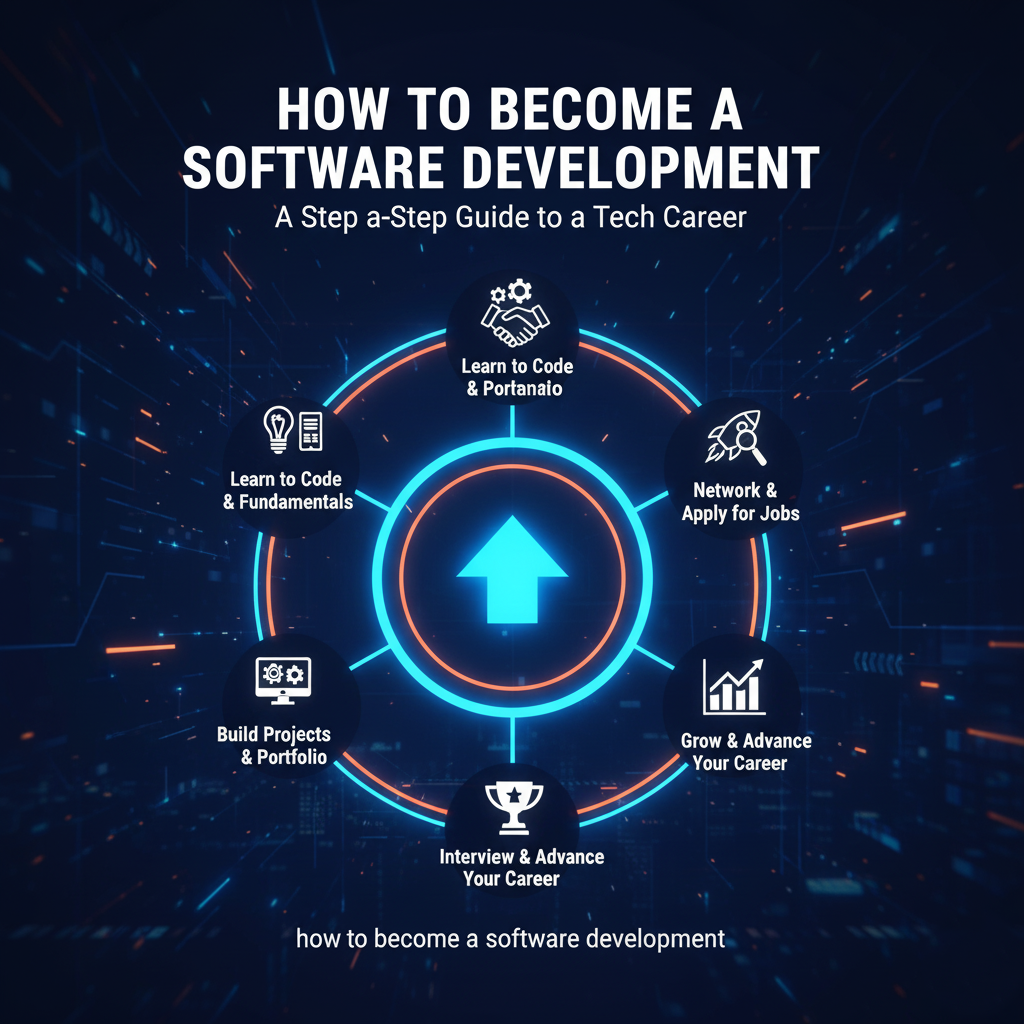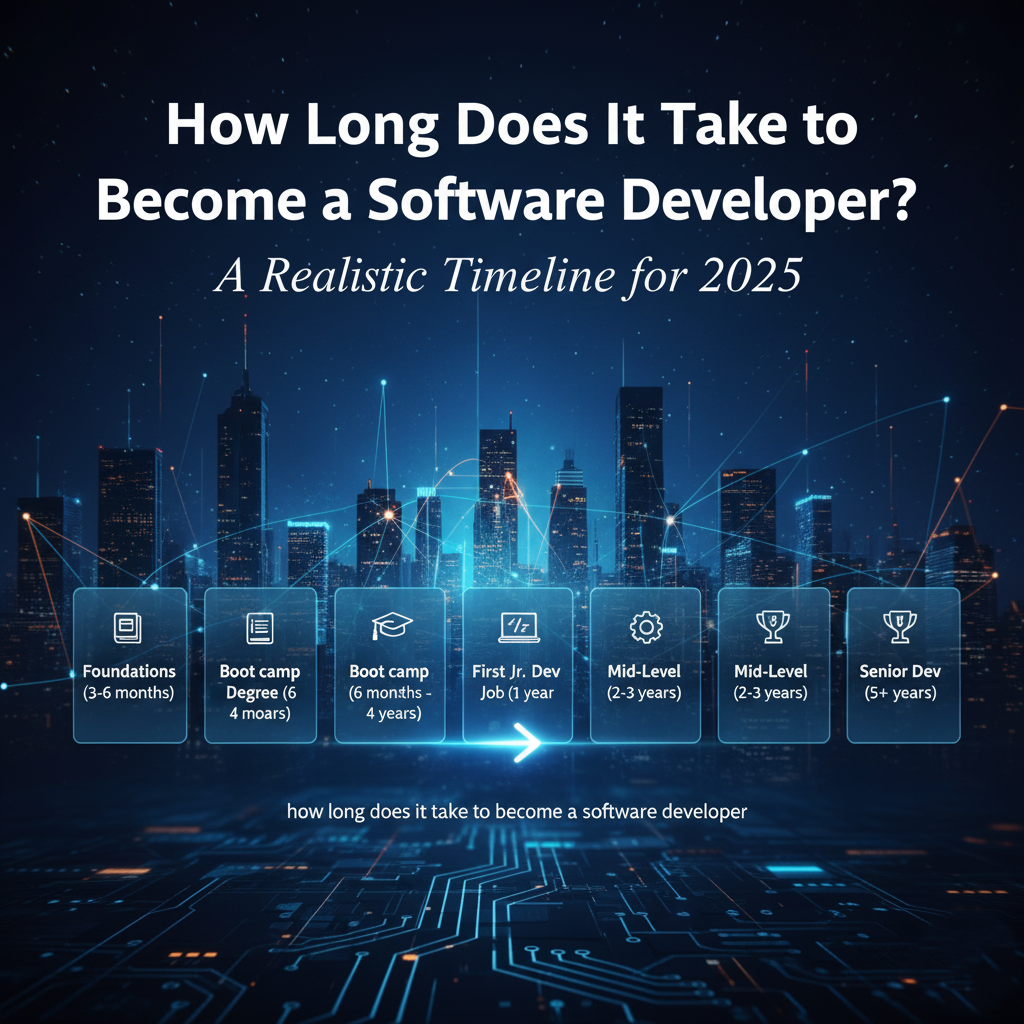The demand for software developers continues to surge, with the U.S. Bureau of Labor Statistics projecting 25% growth in employment from 2022 to 2032—much faster than most occupations. If you’re wondering how to become a software developer, you’re considering a career path that offers excellent compensation, flexibility, and continuous learning opportunities. The best part? You don’t necessarily need a computer science degree to succeed.
Understanding What Software Developers Actually Do
Software developers are professional problem-solvers who use code as their primary tool. Their daily work involves:
- Writing and testing code to create applications and systems
- Debugging and troubleshooting issues in existing software
- Collaborating with team members including designers, product managers, and other developers
- Planning and designing software architecture for scalability and maintainability
Specializations include front-end (user interfaces), back-end (server-side logic), full-stack (both), mobile development, and DevOps (deployment and infrastructure).
Choose Your Learning Path
There are three main routes to becoming a software developer, each with distinct advantages:
Computer Science Degree (4 years)
A traditional degree provides comprehensive theoretical knowledge and is valued by many employers, particularly for roles requiring deep computer science fundamentals. However, it requires significant time and financial investment (typically $40,000-$100,000+).
Coding Bootcamp (3-9 months)
Bootcamps offer intensive, practical training focused on job-ready skills. They typically cost $10,000-$20,000 and often include career support. Graduates usually land jobs within 3-6 months of completion, but the pace can be overwhelming for some.
Self-Taught Route (6-18 months)
This path offers maximum flexibility and lowest cost (often under $1,000). Success requires exceptional discipline and motivation. Many self-taught developers build skills through free resources like freeCodeCamp, The Odin Project, and YouTube tutorials.
Essential Technical Skills to Master
Regardless of your chosen path, these technical skills are non-negotiable:
Programming Fundamentals
Start with core concepts: variables, data types, loops, conditionals, functions, and basic algorithms. These fundamentals transfer across all programming languages.
Core Programming Languages
- JavaScript: Essential for web development
- Python: Versatile and beginner-friendly
- Java: Widely used in enterprise applications
Choose one language to master deeply before adding others to your toolkit.
Development Tools and Technologies
- Git and GitHub for version control
- SQL and databases for data management
- APIs for connecting different software components
- Command line basics for efficient workflow
Building Your Developer Foundation
Practice Computational Thinking
Learn to break down complex problems into manageable steps. Platforms like LeetCode and HackerRank offer practice problems that develop this essential skill.
Understand Data Structures
Arrays, linked lists, stacks, queues, and hash tables form the building blocks of efficient software. You don’t need to memorize implementations, but understanding when to use each structure is crucial.
Master Your Development Environment
Choose an IDE (Integrated Development Environment) like Visual Studio Code and become proficient with its features. Learn debugging techniques to efficiently find and fix errors in your code.
Create a Strong Portfolio
Your portfolio demonstrates your skills better than any resume. Include 3-5 quality projects that showcase different abilities:
Project Ideas That Impress:
- A full-stack web application with user authentication
- A mobile app solving a real problem
- An API that serves useful data
- A contribution to an open-source project
Portfolio Best Practices:
- Host projects live so employers can interact with them
- Maintain clean, well-documented GitHub repositories
- Write detailed README files explaining your projects
- Demonstrate code that follows best practices and style guides
Gain Practical Experience
Internships and Apprenticeships
Many companies offer paid internships specifically designed for those early in their development career. These provide invaluable real-world experience and often lead to full-time offers.
Open Source Contributions
Start with “good first issue” labels on GitHub projects you use or admire. Contributing to open source builds your resume and connects you with experienced developers.
Freelance Projects and Hackathons
Build real-world experience through small freelance projects or weekend hackathons. Even unpaid work for local nonprofits can provide portfolio pieces and professional references.
Job Search Strategy
Optimize Your Application Materials
Create a technical resume that highlights projects and skills rather than just education. Include links to your GitHub, portfolio website, and LinkedIn profile.
Network Strategically
- Attend local tech meetups and conferences
- Connect with developers on LinkedIn (with personalized messages)
- Participate in online communities like Stack Overflow and Dev.to
Application Approach
Quality beats quantity. Research companies that align with your interests and skills. Tailor your application materials for each position rather than sending generic applications everywhere.
Ace the Interview Process
Technical Interview Preparation
- Practice coding challenges regularly
- Study data structures and algorithms
- Practice explaining your thought process aloud
- Prepare for system design questions, even for junior roles
Behavioral Interview Preparation
Use the STAR method (Situation, Task, Action, Result) to structure stories about your experience. Prepare to discuss your projects in detail, including challenges you faced and how you overcame them.
Continue Learning and Growing
Your first development job is just the beginning of your learning journey:
First 90 Days
Focus on learning company systems and processes. Build relationships with colleagues and seek regular feedback. Don’t be afraid to ask questions—it’s expected of new developers.
Career Advancement
As you gain experience, consider specializing in areas that interest you. The field offers numerous paths for growth, from senior technical roles to leadership positions.
Continuous Learning
Stay current by reading industry blogs, attending conferences, and experimenting with new technologies. The most successful developers embrace lifelong learning.
Overcoming Common Challenges
Imposter Syndrome
Many developers experience self-doubt, especially early in their careers. Remember that it’s normal not to know everything—the field is too vast for any one person to master completely.
Learning Plateaus
Progress isn’t always linear. When you hit a learning plateau, building a project using your current skills can provide motivation and reveal gaps in your knowledge.
Job Search Rejections
Every developer faces rejection. Use each interview as a learning experience, asking for feedback when possible and refining your approach.
Conclusion
Becoming a software developer requires dedication and persistence, but the path is more accessible than ever. Start with one small step today—whether it’s writing your first line of code, researching learning resources, or connecting with a developer in your network.
Remember that every expert developer was once a beginner. With consistent effort and the right strategy, you can build the skills and experience needed to launch a rewarding career in software development. The tech industry needs diverse perspectives and problem-solvers from all backgrounds—your unique experiences and approach to thinking could be exactly what employers are seeking.
Frequently Asked Questions (FAQ)
Do I need a computer science degree to become a software developer?
No. While degrees are valuable, many employers prioritize demonstrable skills and experience. Successful developers come from bootcamps, self-study, and related fields.
How long does it take to become job-ready?
With focused effort, most people can reach job-ready status in 6-12 months. The timeline depends on your learning path, prior experience, and time commitment.
What programming language should I learn first?
Python and JavaScript are excellent first languages. Python has simple, readable syntax, while JavaScript lets you build interactive web applications immediately.
Is there age discrimination in tech?
While ageism exists in some companies, many organizations value experienced professionals. Your skills, adaptability, and continuous learning mindset matter more than your age.
What’s the average salary for entry-level developers?
According to Glassdoor, the average entry-level software developer salary in the United States is approximately $75,000, with variations based on location and company.
Can I become a software developer without any math background?
Yes. While math is important for some specializations (like machine learning), many development roles require logical thinking rather than advanced mathematics.




